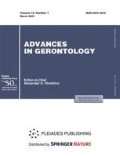Abstract
Results of research of cognitive visual evoked potentials in elderly women with various level of cognitive decline are shown in the article. Both relevance of the early diagnostics of cognitive disorders and expedience of use of methods of functional neurovisualization to reveal higher cortical dysfunctions are also shown. To appraise cognitive functions, we applied an express-method of evaluating of cognitive functions during normal aging. According to results of this test, two groups were created: the first were women without cognitive disorders and the second were women with mild cognitive impairment. The evoked potentials were registered for all participants using a 128-channel GES-300 system. Latency of P300-wave and reaction time were calculated. According to temporary characteristics of a P300-wave, it has been revealed that the group with cognitive decline differed in longer latent period in centro-temporo-parietal area of the left hemisphere, and also longer reaction time. However, latency of P300 in central-parietal areas of the right hemisphere was less than one in persons of the control group. These changes reflect dysfunction of structures of a medial temporal lobe, which is expressed mainly by memory disorders.
Similar content being viewed by others
References
Gnezditskii, V.V., Kulikova, S.N., and Koshurnikova, E.E., Use of the electroencephalogram and p300 for the evaluation of cognitive impairment, Funkts. Diagn., 2009, no. 3, pp. 43–49.
Grinin, V.M. and Shestemirova, E.I., Modern demographic aging in Russia, Vestn. Ross. Akad. Nauk, 2015, vol. 70, no. 3, pp. 348–354.
Zharikova, A.V. and Ponomarev, V.V., Possible use of cognitively evoked potential p300 in clinical practice, Vests. Nats. Akad. Navuk Bel., Ser. Med. Navuk, 2012, no. 2, pp. 105–116.
Zakharov, V.V., Disorders of memory and attention in elderly people, Vestn. Estet. Med., 2009, vol. 8, no. 1, pp. 28–31.
Zakharov, V.V., Memory disorders in the elderly: modern methods of prevention and therapy, Ross. Med. Zh., 2012, no. 8, pp. 422–426.
Korsakova, N.K., Balashova, E.Yu., and Roshchina, I.F., Express diagnostics of cognitive functions in normal aging, Zh. Nevrol. Psikhiatr. im. S.S. Korsakova, 2009, no. 2, pp. 44–50.
Luria, A.R., Vysshie korkovye finktsii cheloveka i ikh narusheniya pri lokal’nykh porazheniyakh mozga (Higher Cortical Functions of a Man and Their Impairments due to Local Brain Lesions), Moscow: Akademicheskii Proekt, 2000, 3rd ed.
Maslovskii, S.Yu., Semenova, M.A., and Gargin, V.V., Age-related changes of the glial-neural index of the frontal gyrus of the human brain, Ukr. Morfol. Al’manakh, 2011, vol. 9, no. 3, pp. 178–179.
Morozova, A.V., Evtushenko, S.K., and Morozova, T.M., Multifocal evoked event-related potentials in the early diagnosis of cognitive disintegration: the clinical and neurophysiological aspects, Mezhd. Nevrol. Zh., 2012, vol. 3, no. 49, pp. 26–41.
Nekhoroshkova, A.N., Gribanov, A.V., and Deputat, I.S., Sensorimotor reactions in psychophysiological studies (a review), Vestn. Sev. (Arkt.) Fed. Univ., Ser. Med.-Biol. Nauki, 2015, no. 1, pp. 38–48.
Yakhno, N.N., Zakharov, V.V., Strachunskaya, E.Ya., et al., Treatment of non-dementia cognitive impairment in patients with arterial hypertension and cerebral atherosclerosis according to the Fuete Russian multicenter study, Nevrol. Zh., 2012, vol. 17, no. 4, pp. 49–55.
Duncan, C.C., Barry, R.J., Connolly, J.F., et al., Event-related potentials in clinical research: Guidelines for eliciting, recording, and quantifying mismatch negativity, P300, and N400, Clin. Neurophysiol., 2009, vol. 120, pp. 1883–1908.
Kim, A.S.N., Vallesi, A., Pictona, T.W., and Tulving, E., Cognitive association formation in episodic memory: evidence from event-related potentials, Neuropsychologia, 2009, no. 47, pp. 3162–3173.
Lech, R.K., Koch, B., Schwarz, M., and Suchan, B., Fornix and medial temporal lobe lesions lead to comparable deficits in complex visual perception, Neurosci. Lett., 2016, vol. 4, no. 620, pp. 27–32.
Mental Health Action Plan 2013–2020, Geneva: World Health Org., 2013.
Old, S.R. and Naveh-Benjamin, M., Differential effects of age on item and associative measures of memory: a meta-analysis, Psychol. Aging, 2008, vol. 3, no. 1, pp. 104–118.
Pini, L., Pievani, M., Bocchetta, M., et al., Brain atrophy in Alzheimer’s disease and aging, Ageing Res. Rev., 2016. doi 10.1016/j.arr.2016.01.002
Possin, K.L., Visual spatial cognition in neurodegenerative disease, Neurocase, 2010, vol. 16, no. 6, pp. 466–487.
Wang, W.C. and Giovanello, K.S., The role of medial temporal lobe regions in incidental and intentional retrieval of item and relational information in aging, Hippocampus, 2016, vol. 26, no. 6, pp. 693–699.
Author information
Authors and Affiliations
Corresponding author
Additional information
Original Russian Text © I.N. Deryabina, Yu.S. Dzhos, 2017, published in Uspekhi Gerontologii, 2017, Vol. 30, No. 1, pp. 103–108.
Rights and permissions
About this article
Cite this article
Deryabina, I.N., Dzhos, Y.S. Characteristics of the cognitive evoked potentials in elderly people with cognitive decline. Adv Gerontol 7, 241–245 (2017). https://doi.org/10.1134/S2079057017030067
Published:
Issue Date:
DOI: https://doi.org/10.1134/S2079057017030067




